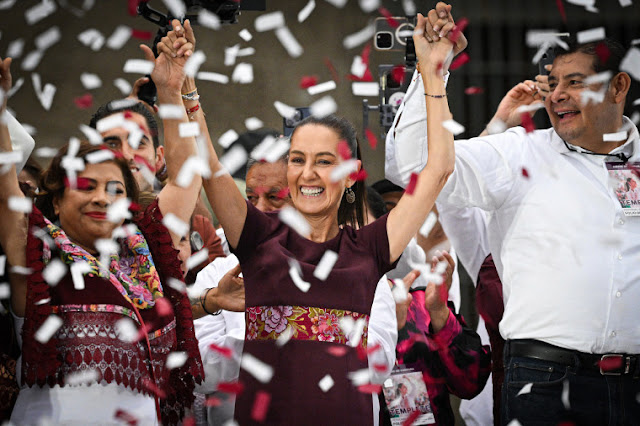Mexico elects first female president with Claudia Sheinbaum as projected winner
A former mayor of Mexico City and an environmental scientist, Sheinbaum is a member of the ruling Morena party and will also be the first Mexican president of Jewish heritage.
Claudia Sheinbaum has made history as the first woman elected president of Mexico, according to projections from the nation's official quick count.
Sheinbaum secured between 58.3% and 60.7% of the vote, based on a statistical sample from the quick count. This was announced early Monday morning by Guadalupe Taddei Zavala of Mexico's National Electoral Institute, who stated the tally is 95% reliable.
Addressing her supporters, Sheinbaum said, "For the first time in 200 years of our republic, I will become the first woman president...but as I've said on other occasions, I did not get here alone."
Sheinbaum emphasized her commitment to building a “diverse and democratic” Mexico.
The former mayor of Mexico City will begin her six-year term on October 1.
At 61, Sheinbaum, a physicist and climate scientist, will also be Mexico’s first president of Jewish heritage.
As a member of the governing Morena party, Sheinbaum will play a crucial role in addressing issues important to the U.S., such as immigration and foreign affairs, and in determining the future of the trade deal that has made Mexico the United States’ largest trade partner.
The National Electoral Institute projected a voter turnout of about 60%, according to Taddei Zavala.
Sheinbaum is expected to follow the path of her mentor, outgoing President Andrés Manuel López Obrador. Since its founding by López Obrador, the leftist Morena party has dominated Mexican politics, especially since his landslide victory in 2018.
Sheinbaum has vowed to maintain the welfare policies and social programs that have helped Morena retain strong voter approval.
Regarding the country’s high levels of violence, Sheinbaum plans to continue her predecessor’s “hugs, not bullets” strategy, which avoids directly confronting criminal organizations that control large parts of Mexico and are involved in drug trafficking, migrant smuggling, and extortion.
Although López Obrador’s policy has not significantly reduced homicides, with at least 102,400 reported over the past six years, data shows that previous strategies of aggressively targeting drug lords were also ineffective in improving safety.
In contrast to López Obrador, Sheinbaum has advocated for a greater use of renewable energy throughout her campaign.
From Environmental Chief to President
Sheinbaum’s political journey began in 2000 when she became Mexico City’s environment chief under then-Mayor López Obrador. She later served as his chief spokesperson during his unsuccessful 2006 presidential campaign. In 2015, she was elected to run Mexico City’s largest borough, Tlalpan, and in 2018, she made history as the city’s first female mayor.
Daughter of a chemical engineer and a cell biologist, Sheinbaum credits her parents with instilling her love of science and politics. She studied physics and earned a Ph.D. in environmental engineering. As a member of the United Nations’ Intergovernmental Panel on Climate Change, Sheinbaum was among the scientists who shared a 2007 Nobel Peace Prize for their report.
Growing up in Mexico City, Sheinbaum took ballet and guitar lessons and volunteered at 15 to help mothers searching for their missing children, a long-standing issue in Mexico.
In the 1980s, Sheinbaum was active in student movements and protests against state intervention in education policies. She earned her doctorate in energy engineering from the National Autonomous University of Mexico in 1995 before pursuing an academic career.




0 Comments